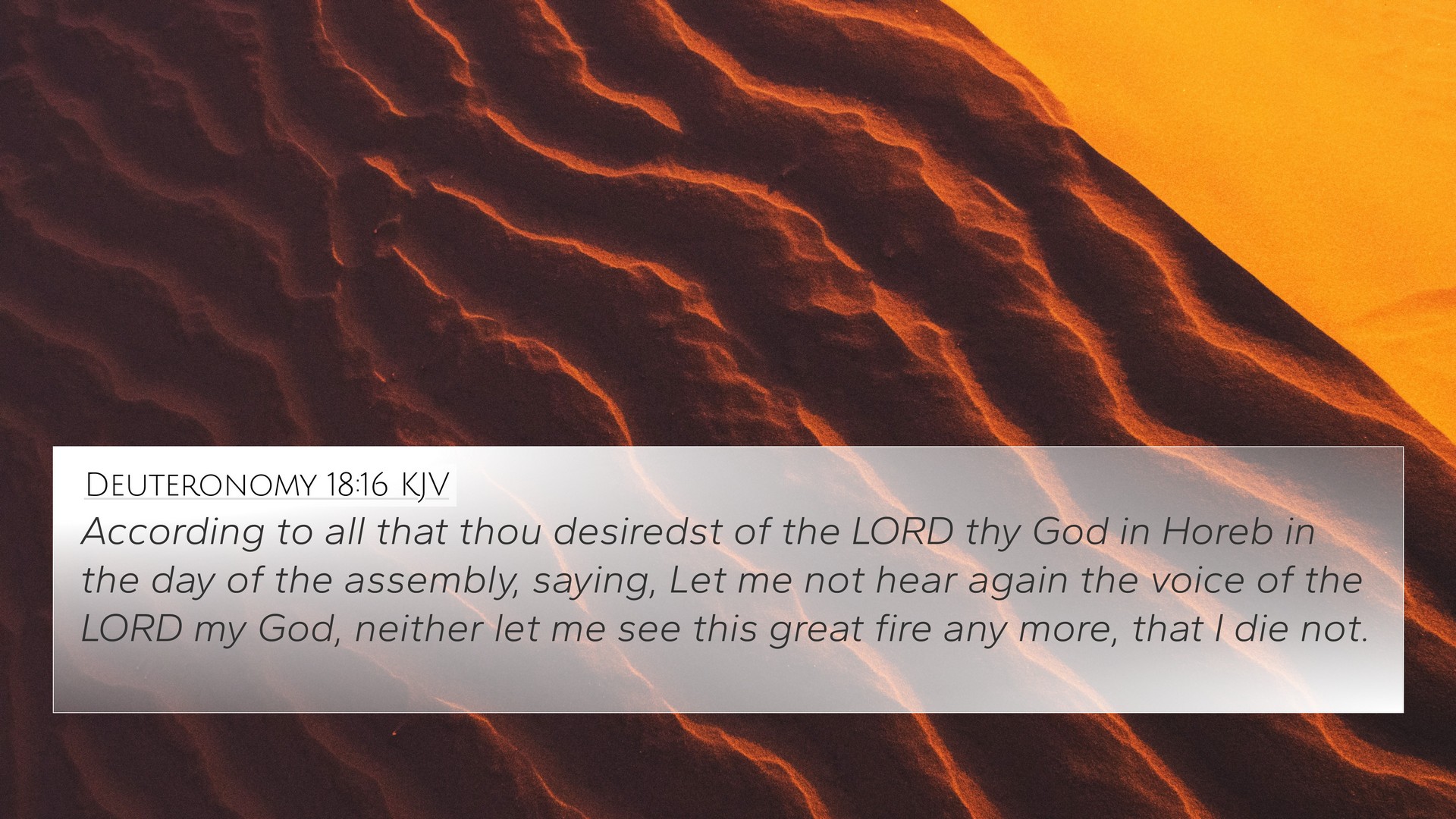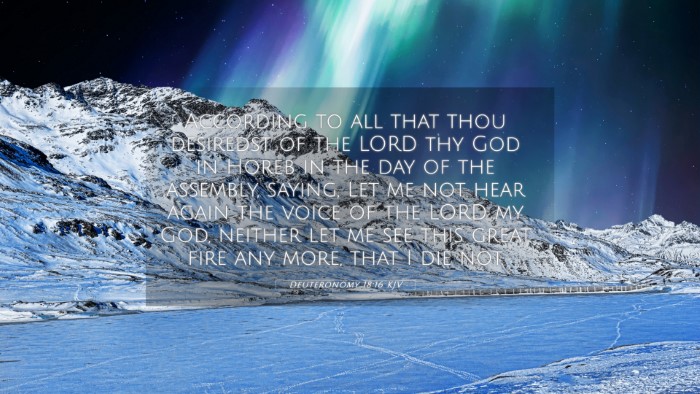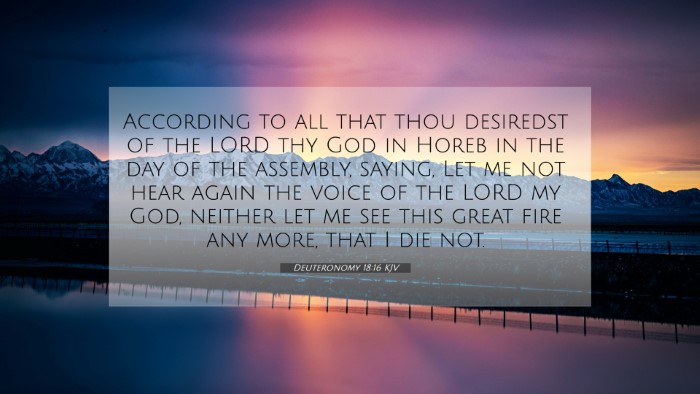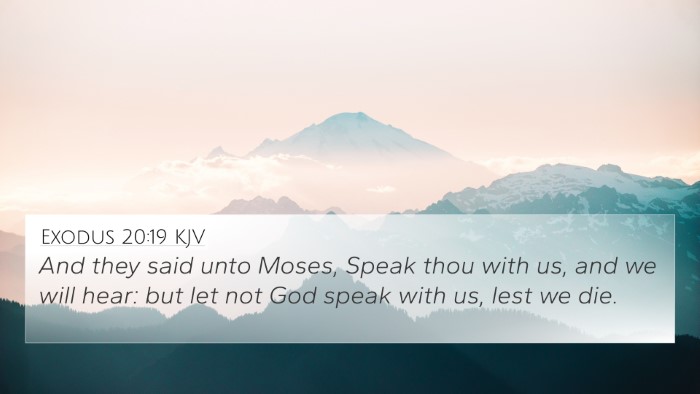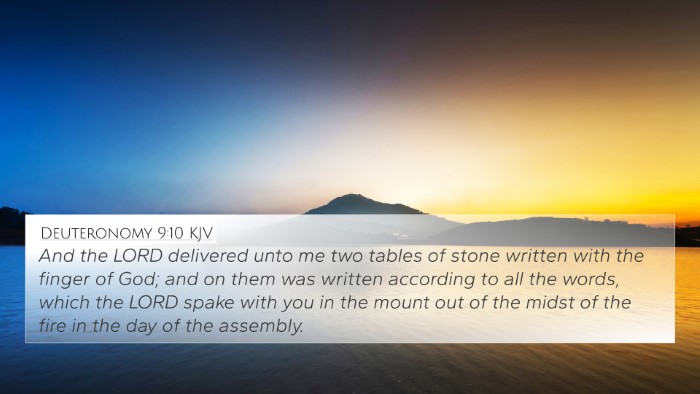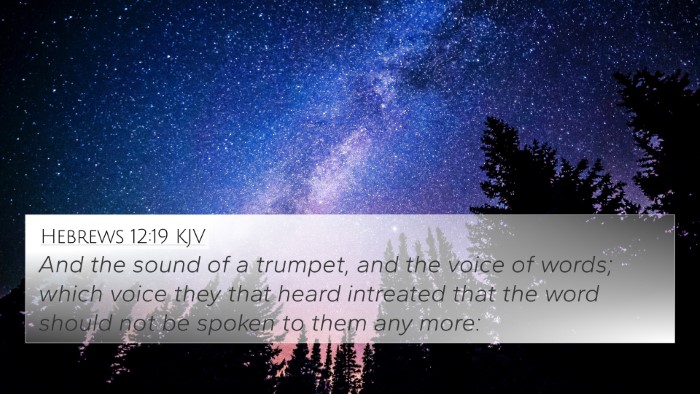Understanding Deuteronomy 18:16
Verse: “According to all that you desired of the LORD your God in Horeb in the day of the assembly, saying, 'Let me not hear again the voice of the LORD my God, nor let me see this great fire anymore, lest I die.'” (Deuteronomy 18:16, NKJV)
Summary of the Verse
This verse speaks to the people of Israel's request to God during their assembly at Mount Horeb. It reflects their fear of directly facing God's presence, particularly His voice and the manifestation of His power in fire. God acknowledges this desire and prepares to establish a means of communication through future prophets.
Commentary Insights
This section integrates insights from various public domain commentaries including Matthew Henry, Albert Barnes, and Adam Clarke, to build a coherent understanding of Deuteronomy 18:16.
Matthew Henry's Commentary
Matthew Henry suggests that this verse captures the essence of the Israelites’ fear in God’s presence. Their request was both an expression of reverence and a manifestation of their frailty. Henry interprets their plea not just as a desire to avoid God's wrath but as an acknowledgment of God's majesty. He notes that God honors their request by promising to raise up prophets to speak to them on His behalf.
Albert Barnes’ Commentary
Albert Barnes elaborates on the historical context, pinpointing that the people were terrified after experiencing God's awesome displays of power. He views their request as a pivotal moment where God begins to establish prophetic leadership to bridge the gap between Himself and the people. Barnes emphasizes how God’s provision of prophets shows His mercy and willingness to guide them through chosen individuals who will convey His will.
Adam Clarke's Commentary
Adam Clarke provides further insights, commenting on the significance of Horeb as a holy site of revelation. He discusses the implications of fearing God and desiring intermediaries, situating their request within broader theological themes of mediation and divine communication. Clarke also indicates that this moment points toward a prophetic tradition that continues in the following scriptures, leading to a greater realization of God’s redemptive plan through Jesus Christ.
Cross-References
Deuteronomy 18:16 connects with several other Bible verses that enrich our understanding of God’s communication methods and prophetic traditions. Here are some significant cross-references:
- Exodus 20:19: The people's fear of God's direct voice.
- 1 Samuel 3:9-10: God speaks to Samuel, illustrating the call of a prophet.
- Hebrews 1:1-2: God’s revelation through prophets culminating in Christ.
- Acts 3:22: Peter cites Moses, affirming the prophetic tradition initiated in Deuteronomy.
- Numbers 12:6: God's instruction about prophets and visions.
- Matthew 17:5: The voice of God affirming Jesus as His chosen one.
- John 1:21: Jewish leaders questioning John the Baptist about his identity as a prophet.
Thematic Connections
This verse also opens up thematic connections throughout the Bible regarding mediation, divine authority, and human fear:
- Prophetic Mediation: This verse establishes a precedent for God speaking through individuals.
- Human Fear vs Divine Presence: Explores the tension between knowing God and the fear of His power.
- Covenantal Relationship: Reflects God’s commitment to His people despite their frailty.
Conclusion
Deuteronomy 18:16 serves not only as a historical record but also as a significant theological milestone illustrating God’s design for communication with humanity. Through the fear and desire expressed by the Israelites, we uncover a profound understanding of God's self-revelation, advancing toward the New Testament’s fulfillment in Christ.
Further Studies
To delve deeper into the concepts of prophetic ministry and God’s communication style, consider the following:
- Explore tools for Bible cross-referencing to better understand inter-Biblical dialogues.
- Utilize a Bible concordance for in-depth study of related verses.
- Engage with cross-reference Bible study methods to connect themes across scripture.
This holistic understanding of Deuteronomy 18:16 enriches the reader’s experience of the Bible through effective scriptural cross-referencing and highlights the interrelation between various texts, culminating in a unified narrative of God’s engagement with His people.
